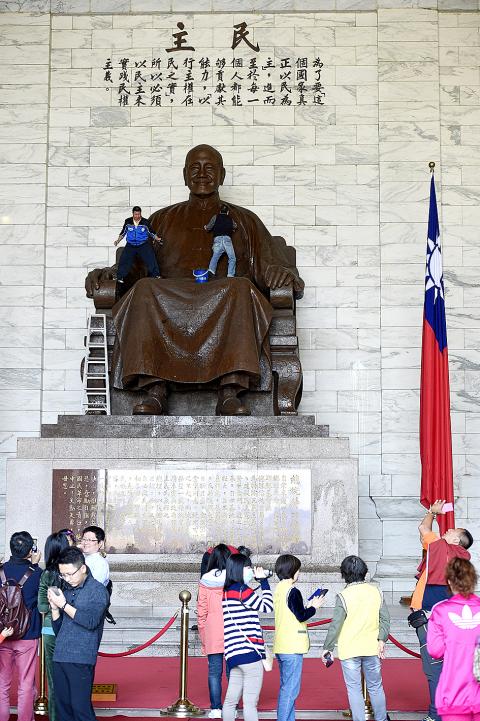Dealing with the National Chiang Kai-shek Memorial Hall tops the Transitional Justice Commission's to-do list, commission member Yang Tsui (楊翠) said yesterday.
Removing the hall’s statue of Chiang Kai-shek (蔣介石) has been prioritized as the first step toward enacting the commission’s mandate stipulated in the Act on Promoting Transitional Justice (促進轉型正義條例) to “remove all symbols of authoritarianism and preserve the sites of injustice,” Yang said in an exclusive interview with the Liberty Times (sister newspaper of the Taipei Times), adding that discussions with the Ministry of Culture regarding the move are under way.
“The commission is mulling three options for the change: relocating the statue, designating the hall as a ‘negative heritage site’ or destroying the statue altogether,” Yang said.

Photo: George Tsorng, Taipei Times
However, destroying the statue would create the risk that younger generations would not recognize Chiang, let alone see him as the authoritarian figure that he is, she added.
The commission is also mulling changes to the physical layout of the hall to portray a different look from the past authoritarian regime, especially in terms of historical memory, Yang said.
It would become a public space, where any visitor would immediately learn the historical truth about incidents in Taiwan and understand that Chiang was a dictator who presided over atrocities, Yang said.
They would be made to understand how the authoritarian regime operated and would be presented with memories, Yang said.
“The goal of the changes is to elucidate how Chiang should be remembered,” Yang said, adding that regardless of which solution is adopted, Chiang would not continue to be worshiped.
“The statue, enshrined within the hall and treated like a god, will either be moved or undergo changes that would remove it as an icon of authoritarian worship,” Yang said, adding that the changes would not be for tourism or commercial purposes.
Yang, a Taiwanese literature academic, is one of the commission’s three full-time members.
The act, passed in December last year, stipulates the creation of a nine-member committee of the Executive Yuan entrusted with making political archives more readily accessible, including the retrieval of those kept by the Chinese Nationalist Party (KMT); removing remnants of authoritarian rule; redressing miscarriages of justice; producing a historical report on the period; and promoting transitional justice.
The Democratic Progressive Party-controlled Legislative Yuan on May 8 approved all nine commission members nominated by Premier William Lai (賴清德), while the KMT and People First Party caucuses abstained.

Tropical Storm Gaemi strengthened into a typhoon at 2pm yesterday, and could make landfall in Yilan County tomorrow, the Central Weather Administration (CWA) said yesterday. The agency was scheduled to issue a sea warning at 11:30pm yesterday, and could issue a land warning later today. Gaemi was moving north-northwest at 4kph, carrying maximum sustained winds near its center of up to 118.8kph and gusts of 154.8kph. The circumference is forecast to reach eastern Taiwan tomorrow morning, with the center making landfall in Yilan County later that night before departing from the north coast, CWA weather forecaster Kuan Shin-ping (官欣平) said yesterday. Uncertainty remains and

SEA WARNING LIKELY: The storm, named Gaemi, could become a moderate typhoon on Wednesday or Thursday, with the Taipei City Government preparing for flooding A tropical depression east of the Philippines developed into a tropical storm named Gaemi at 2pm yesterday, and was moving toward eastern Taiwan, the Central Weather Administration (CWA) said. Gaemi could begin to affect Taiwan proper on Tuesday, lasting until Friday, and could develop into a moderate typhoon on Wednesday or Thursday, it said. A sea warning for Gaemi could be issued as early as Tuesday morning, it added. Gaemi, the third tropical storm in the Pacific Ocean this typhoon season, is projected to begin moving northwest today, and be closest to Taiwan on Wednesday or Thursday, the agency said. Today, there would likely

DISRUPTIONS: The high-speed rail is to operate as normal, while several airlines either canceled flights or announced early departures or late arrivals Schools and offices in 15 cities and counties are to be closed today due to Typhoon Gaemi, local governments announced last night. The 15 are: Taipei, New Taipei City, Taoyuan, Tainan, Keelung, Hsinchu and Kaohsiung, as well as Yilan, Hualien, Hsinchu, Miaoli, Chiayi, Pingtung, Penghu and Lienchiang counties. People should brace for torrential rainfall brought by the storm, with its center forecast to make landfall on the east coast between tonight and tomorrow morning, the Central Weather Administration (CWA) said. The agency issued a sea warning for the typhoon at 11:30pm on Monday, followed by a land warning at 11:30am yesterday. As of

CASUALTY: A 70-year-old woman was killed by a falling tree in Kaohsiung as the premier warned all government agencies to remain on high alert for the next 24 hours Schools and offices nationwide are to be closed for a second day today as Typhoon Gaemi crosses over the nation, bringing torrential rain and whipping winds. Gaemi was forecast to make landfall late last night. From Tuesday night, its outer band brought substantial rainfall and strong winds to the nation. As of 6:15pm last night, the typhoon’s center was 20km southeast of Hualien County, Central Weather Administration (CWA) data showed. It was moving at 19kph and had a radius of 250km. As of 3pm yesterday, one woman had died, while 58 people were injured, the Central Emergency Operation Center said. The 70-year-old